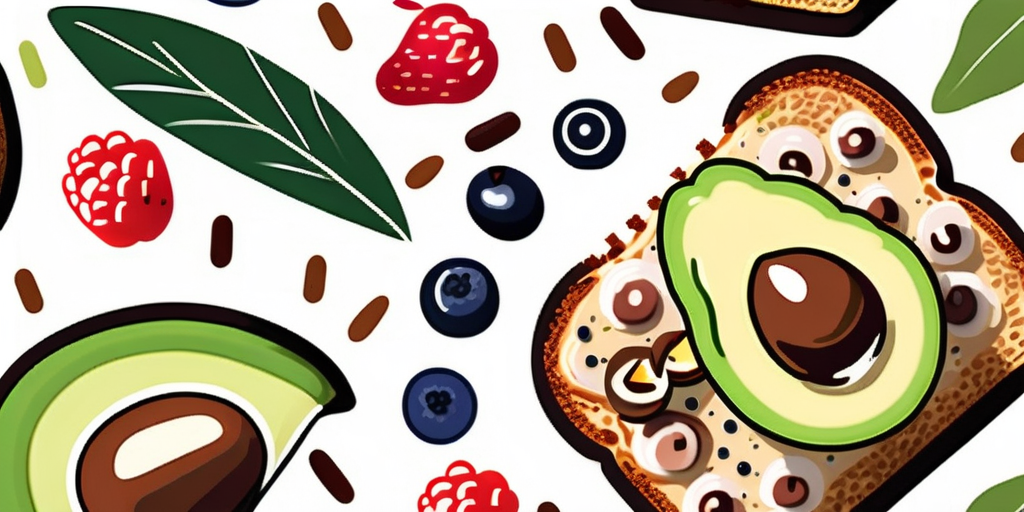In today's fast-paced world, it's essential to start your day off with a nutritious meal that provides you with the energy and nutrients you need to tackle whatever comes your way. One such option that fits the bill perfectly is whole grain toast. Not only is it delicious, but it also offers a multitude of health benefits that make it an excellent choice for your breakfast routine. In this article, we will delve into the benefits of whole grain toast, understand what whole grains are, explore its nutritional profile, discuss its role in a balanced breakfast, examine its health benefits, and provide some tips on how to incorporate it into your daily routine. So let's get started!
Understanding Whole Grains
What are Whole Grains?
Whole grains are grains that contain all parts of the original grain, including the bran, germ, and endosperm. This means that they retain all the important nutrients and fiber found naturally in the grain, making them a healthier choice compared to refined grains.
When you consume whole grains, you are getting the full package of nutrients that nature intended. The bran, which is the outer layer of the grain, contains a significant amount of fiber, B vitamins, antioxidants, and minerals such as iron, zinc, and magnesium. The germ, which is the embryo of the grain, is rich in healthy fats, vitamin E, B vitamins, and phytochemicals. And finally, the endosperm, which is the starchy part of the grain, provides energy in the form of carbohydrates and small amounts of protein.
By including whole grains in your diet, you are not only nourishing your body with essential nutrients but also benefiting from the fiber content. Fiber plays a crucial role in digestion, promoting regular bowel movements, and preventing constipation. It also helps to regulate blood sugar levels, reduce cholesterol levels, and maintain a healthy weight.
The Difference Between Whole Grains and Refined Grains
Refined grains, on the other hand, undergo a process where the bran and germ are removed, stripping away many of the essential nutrients and fiber. What remains is the nutrient-deficient endosperm. This refining process gives grains a finer texture and extends their shelf life but also diminishes their nutritional value. Whole grains, on the other hand, retain all their goodness, offering a range of health benefits.
When grains are refined, they lose a significant portion of their fiber content. This is problematic because fiber is not only important for digestion but also for maintaining a feeling of fullness, which can aid in weight management. Additionally, the removal of the bran and germ eliminates many of the vitamins, minerals, and antioxidants that are beneficial for overall health.
Refined grains are commonly found in processed foods such as white bread, white rice, and sugary cereals. These products may be convenient and have a longer shelf life, but they lack the nutritional value that whole grains provide. By choosing whole grains over refined grains, you are making a conscious decision to prioritize your health and well-being.
It's worth noting that not all products labeled as "whole grain" are created equal. Some may contain a mixture of whole grains and refined grains, so it's important to read the ingredient list carefully. Look for products that list whole grains as the first ingredient and avoid those that contain added sugars or unhealthy fats.
Nutritional Profile of Whole Grain Toast
Fiber Content and Its Benefits
One of the significant advantages of whole grain toast is its high fiber content. Fiber is essential for maintaining a healthy digestive system and preventing constipation. Additionally, it helps regulate blood sugar levels, lowers cholesterol levels, and promotes a feeling of fullness, making it easier to control your weight.

Let's delve deeper into the benefits of fiber in whole grain toast. Fiber is a type of carbohydrate that cannot be digested by the body. Instead, it passes through the digestive system relatively intact, adding bulk to the stool and promoting regular bowel movements. This is particularly important for individuals who struggle with constipation or irregularity.
Furthermore, fiber plays a crucial role in regulating blood sugar levels. When we consume carbohydrates, they are broken down into sugar and absorbed into the bloodstream. However, fiber slows down this process, preventing a rapid spike in blood sugar levels. This is especially beneficial for individuals with diabetes or those looking to manage their blood sugar levels.
In addition to its impact on digestion and blood sugar control, fiber also aids in lowering cholesterol levels. It does this by binding to cholesterol in the digestive system and preventing its absorption into the bloodstream. By reducing cholesterol levels, fiber helps protect against heart disease and promotes overall cardiovascular health.
Lastly, the feeling of fullness that fiber provides can be beneficial for weight management. High-fiber foods, like whole grain toast, take longer to chew and digest, which can help you feel satisfied for longer periods. This can prevent overeating and contribute to maintaining a healthy weight.
Essential Vitamins and Minerals in Whole Grains
Whole grain toast is not only a great source of fiber but also rich in essential vitamins and minerals. These include B vitamins such as thiamine, riboflavin, and niacin, which play a vital role in energy production and brain function.
Thiamine, also known as vitamin B1, is involved in converting carbohydrates into energy and is crucial for the proper functioning of the nervous system. Riboflavin, or vitamin B2, is essential for the metabolism of fats, proteins, and carbohydrates, as well as maintaining healthy skin and eyes. Niacin, or vitamin B3, is involved in energy production, DNA repair, and the maintenance of healthy skin.
Furthermore, whole grains contain important minerals like iron, magnesium, and selenium, which are necessary for various bodily functions. Iron is essential for the production of red blood cells and the transportation of oxygen throughout the body. Magnesium is involved in over 300 biochemical reactions in the body, including muscle and nerve function, protein synthesis, and blood pressure regulation. Selenium acts as an antioxidant, protecting cells from damage and supporting a healthy immune system.
By incorporating whole grain toast into your diet, you can benefit from these essential vitamins and minerals, supporting your overall health and well-being.
The Role of Whole Grain Toast in a Balanced Breakfast
Breakfast is often hailed as the most important meal of the day, and for good reason. It provides us with the necessary fuel to jumpstart our day and sets the tone for our overall energy levels and productivity. One popular breakfast choice that has gained recognition for its nutritional benefits is whole grain toast.

Satiety and Energy Levels
Starting your day with whole grain toast can provide you with a significant boost of energy to kickstart your morning. The combination of complex carbohydrates and fiber helps slow down digestion, providing a steady release of energy throughout the day. This sustained energy can help you stay focused and alert, enabling you to tackle your daily tasks with ease.
But the benefits of whole grain toast don't stop there. The feeling of fullness you get from the fiber in whole grain toast can help control your appetite, preventing overeating and unnecessary snacking later in the day. This can be especially beneficial for those trying to maintain a healthy weight or manage their calorie intake.
Furthermore, the fiber in whole grain toast acts as a prebiotic, nourishing the beneficial bacteria in your gut. A healthy gut microbiome has been linked to improved digestion, enhanced immune function, and even better mental health.
Pairing Whole Grain Toast with Other Healthy Foods
To make your breakfast even more nutritious and delicious, you can pair whole grain toast with other healthy foods. For example, topping your toast with a spread of avocado or natural nut butter provides healthy fats and additional vitamins and minerals. Avocado is rich in monounsaturated fats, which are known to support heart health, while nut butter offers a good dose of protein and essential nutrients like vitamin E and magnesium.
You can also add sliced fruits, such as bananas or berries, to enhance the taste and increase the fiber content further. These fruits not only add natural sweetness but also provide a wide range of vitamins, minerals, and antioxidants. Bananas are a great source of potassium, which helps regulate blood pressure, while berries are packed with antioxidants that protect against cellular damage and promote overall health.
For those who prefer a savory twist, adding a poached egg or some smoked salmon on top of your whole grain toast can provide a protein-packed start to your day. Protein is essential for muscle repair and growth, and it also helps keep you feeling satisfied for longer periods.
Don't forget about the power of herbs and spices! Sprinkling some fresh herbs like basil or cilantro on your toast can add a burst of flavor and provide additional health benefits. Herbs are rich in antioxidants and have been shown to possess anti-inflammatory properties, promoting overall well-being.
As you can see, the possibilities are endless when it comes to pairing whole grain toast with other healthy foods. Get creative and experiment with different combinations to find your perfect balanced breakfast!
Health Benefits of Consuming Whole Grain Toast
Heart Health and Whole Grains
Regular consumption of whole grains, such as whole grain toast, has been linked to a reduced risk of heart disease. The fiber content in whole grains helps lower cholesterol levels and maintain healthy blood pressure, both of which are key factors in maintaining cardiovascular health. Incorporating whole grain toast into your breakfast routine is a simple and tasty way to support your heart health.
In addition to its fiber content, whole grain toast is also rich in antioxidants. These powerful compounds help protect the heart by reducing inflammation and preventing the oxidation of cholesterol, which can lead to plaque buildup in the arteries. By including whole grain toast in your diet, you are providing your body with a wide range of nutrients that support overall heart health.
Furthermore, whole grain toast contains a variety of vitamins and minerals that are beneficial for the heart. These include vitamin E, which helps prevent the formation of blood clots, and magnesium, which helps regulate blood pressure. By choosing whole grain toast over refined white bread, you are making a heart-healthy choice that can have long-term benefits for your cardiovascular system.
Whole Grains and Digestive Health
As mentioned earlier, the fiber in whole grain toast promotes a healthy digestive system. It adds bulk to your stools, aiding regular bowel movements and preventing constipation. Additionally, the fiber acts as a prebiotic, promoting the growth of beneficial bacteria in your gut, which has been linked to improved overall digestive health and a stronger immune system.
But the benefits of whole grain toast for digestive health don't stop there. Whole grains also contain a type of fiber called resistant starch, which acts as a fuel source for the good bacteria in your gut. This helps maintain a healthy balance of gut flora, which is essential for proper digestion and nutrient absorption.
Moreover, whole grain toast is a great source of B vitamins, including thiamin, niacin, and folate. These vitamins play a crucial role in converting food into energy and supporting the normal functioning of the digestive system. By incorporating whole grain toast into your diet, you are providing your body with the necessary nutrients to support optimal digestive health.
Lastly, whole grain toast contains phytochemicals, which are natural compounds found in plants that have been shown to have numerous health benefits. Some phytochemicals found in whole grains, such as lignans and phenolic acids, have been linked to a reduced risk of digestive disorders, including colon cancer. By choosing whole grain toast as part of your daily diet, you are not only enjoying a delicious and satisfying meal, but also taking a proactive step towards maintaining a healthy digestive system.
Incorporating Whole Grain Toast into Your Daily Routine
Delicious Whole Grain Toast Recipes
To keep things interesting, here are a few delicious whole grain toast recipes to inspire your breakfast creations:

- Avocado and Tomato Toast: Spread mashed avocado on your toast and top it with freshly sliced tomatoes, a sprinkle of salt, and a drizzle of olive oil.
- Peanut Butter and Banana Toast: Spread natural peanut butter on your toast and top it with sliced bananas. Drizzle with honey for a touch of sweetness.
- Egg and Spinach Toast: Poach an egg and place it on top of your toast. Add a handful of fresh spinach leaves and a sprinkle of salt and pepper.
Tips for Buying Whole Grain Bread
When shopping for whole grain bread, it's essential to look for key indicators that ensure you're making a nutritious choice:
- Check the Ingredients: Look for bread that lists whole grains, such as whole wheat, whole oats, or whole rye, as the first ingredient. Avoid bread that lists refined grains, such as white flour or enriched flour.
- Look for the Whole Grain Stamp: Many whole grain products feature a stamp from the Whole Grains Council, indicating that they meet specific whole grain criteria. This can help you make an informed choice.
- Consider the Texture and Taste: Whole grain bread comes in many different varieties, so find one that suits your preferences. Whether you prefer a rustic whole grain bread or a softer sandwich bread, there is an option out there for you.
In conclusion, whole grain toast offers a nutritious and delicious start to your day. With its high fiber content, essential vitamins and minerals, and numerous health benefits, it's clear that incorporating whole grain toast into your breakfast routine is a smart choice. From supporting heart health and digestive health to providing sustained energy and promoting satiety, the benefits of whole grain toast are too significant to ignore. So next time you're deciding what to have for breakfast, reach for that whole grain bread and start your day off right!




